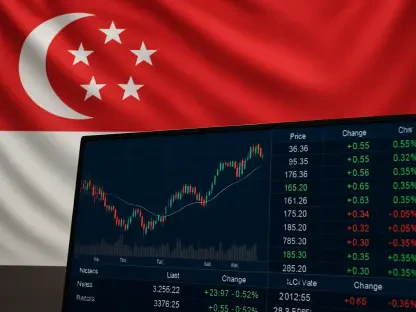In the wake of a transformed global economy, businesses are once again turning their attention to international markets, compelled by a blend of urgent necessity and unprecedented opportunity. The post-pandemic landscape has reshaped how companies operate, with disrupted supply chains, evolving consumer preferences, and intensified competition creating a pressing need to look beyond domestic borders for growth. What was once considered an ambitious, optional endeavor has now become a cornerstone of strategic planning, essential for survival and maintaining relevance in an interconnected world. This renewed focus on global expansion is not merely about increasing revenue; it reflects a deeper understanding that staying confined to a single market can expose firms to significant risks, from economic downturns to aggressive foreign competitors. This article delves into the driving forces behind this trend, examining how strategic shifts, innovative market entry tactics, and a heightened emphasis on cultural and ethical factors are shaping the path to successful international growth.
A New Perspective on Growth
The mindset surrounding global expansion has undergone a profound transformation, moving from a discretionary choice to an indispensable strategy for businesses aiming to thrive. Companies that remain tethered to their home markets often find their growth potential stifled, leaving them exposed to regional economic fluctuations and the threat of international competitors gaining a foothold in their territory. Venturing into foreign markets provides access to untapped customer segments, creates diversified income sources, and fosters a brand with global resonance. This approach is increasingly viewed as a safeguard against localized downturns, ensuring long-term stability in an unpredictable economic climate. Beyond mere survival, expanding internationally allows firms to position themselves as leaders in innovation and adaptability, capitalizing on opportunities that domestic confinement would never afford.
Equally significant is the dual role of global expansion as both a defensive and offensive maneuver in the face of mounting competitive pressures. Many businesses are driven to enter new regions not just to pursue growth, but to protect their existing market share from foreign challengers making inroads at home. By establishing a presence abroad, companies can redefine their brand story and connect with audiences who have no prior perceptions, offering a fresh start, particularly in sectors like automotive and consumer electronics where regional players are rapidly gaining traction. This strategic move serves as a counterbalance, enabling firms to mitigate risks associated with losing ground domestically while simultaneously building a stronger, more resilient global footprint. The urgency to act is clear—remaining static often translates to losing influence in an era where competition knows no borders.
Modern Approaches to Entering Markets
Traditional methods of global expansion, such as relying on a local distributor or forming rudimentary partnerships, have become outdated in the face of today’s complex international landscape. Modern market entry demands a meticulous understanding of local laws, cultural intricacies, and consumer expectations, prompting companies to invest heavily in comprehensive pre-entry research. Specialized advisors are often brought on board to develop customized strategies for diverse regions like Asia or Africa, where missteps can lead to reputational damage not just locally but on a global scale. This shift toward thorough preparation underscores a broader recognition that success abroad hinges on avoiding costly errors from the outset. Businesses are now prioritizing detailed groundwork to ensure their approach resonates with the unique dynamics of each target market.
Technology and data analytics have emerged as game-changers in how companies navigate the challenges of entering new territories. Sophisticated tools like location intelligence, which integrate factors such as purchasing power and infrastructure developments, enable firms to forecast product performance before committing substantial resources. Cloud-based platforms, AI-driven demand prediction, and digital marketing solutions further enhance operational agility, allowing businesses to tailor their offerings to local needs while preserving a cohesive global identity. These technological advancements minimize guesswork, providing actionable insights that reduce risk and boost the likelihood of market acceptance. As a result, companies can move swiftly and confidently, adapting to regional demands with precision and maintaining a competitive edge in an increasingly data-driven world.
Balancing Cultural Nuances and Ethical Standards
Achieving success in international markets often depends on a deep appreciation for cultural differences, making sensitivity to local customs and behaviors a critical component of any expansion strategy. Businesses are placing greater emphasis on recruiting local talent from the earliest stages and implementing cross-cultural training for their teams to prevent misunderstandings that could alienate potential customers. Even seemingly minor decisions, such as adjusting brand messaging or product packaging, can significantly influence how a company is perceived in a new region. This focus on the human element reflects an understanding that building trust and relevance abroad requires more than just a strong product—it demands a genuine connection with the community. Firms that prioritize these cultural considerations are better positioned to foster loyalty and avoid pitfalls that could derail their efforts.
Alongside cultural awareness, ethical responsibility has become a defining factor in modern global expansion, with stakeholders expecting companies to make positive contributions to the regions they enter. Governments, investors, and consumers alike are holding multinational corporations to high standards, demanding practices like ethical sourcing, transparent supply chains, and minimized environmental impact. Embracing sustainability is not just about meeting regulatory requirements; it also serves as a pathway to earning goodwill, which can translate into a stronger market presence. Companies that integrate these principles into their operations often gain a competitive advantage, as responsible behavior resonates with increasingly conscious audiences. Ignoring these expectations, conversely, risks regulatory obstacles and public backlash, highlighting the importance of aligning expansion with ethical and sustainable goals.
Looking Ahead to Sustainable Global Success
Reflecting on the journey of global expansion in recent times, it’s evident that businesses turned to international markets as a response to evolving economic challenges and competitive landscapes. The pivot was marked by a departure from viewing expansion as a luxury to recognizing it as a necessity for resilience and growth. Strategies evolved, with a greater reliance on data, technology, and cultural understanding to navigate the complexities of foreign markets. Ethical considerations also took center stage, as firms adapted to expectations of sustainability and responsibility, shaping how they were perceived worldwide. This period demonstrated that success abroad required a delicate balance of innovation and adaptability, setting a precedent for future endeavors.
Moving forward, companies must continue to refine their approaches, leveraging advanced tools and insights to anticipate market shifts while fostering meaningful local connections. Prioritizing long-term commitments over short-term gains will be key, as will integrating sustainable practices into core operations to meet global expectations. Collaboration with regional partners and ongoing investment in cultural competence can further enhance outcomes, ensuring that expansion efforts yield lasting impact. As the global economy continues to evolve, businesses that embrace these principles will likely find themselves at the forefront, turning the challenges of international growth into opportunities for enduring success.









